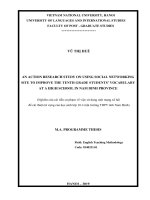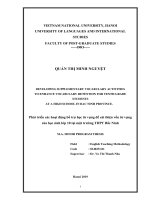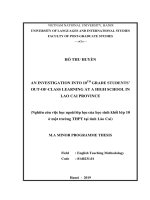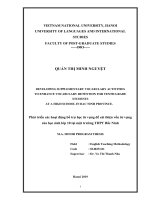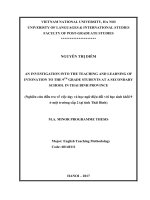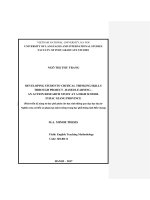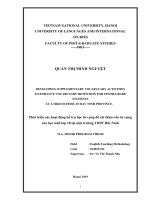Esp learners vocabulary learning at a vocational school in khanh hoa province
Bạn đang xem bản rút gọn của tài liệu. Xem và tải ngay bản đầy đủ của tài liệu tại đây (1.12 MB, 113 trang )
MINISTRY OF EDUCATION AND TRAINING
QUY NHON UNIVERSITY
NGUYEN HUONG XUAN
ESP LEARNERS’ VOCABULARY LEARNING AT
A VOCATIONAL SCHOOL IN KHANH HOA
PROVINCE
Major: Theory and Methodology of English Language Teaching
Code: 8140111
SUPERVISOR: ASSOC. PROF. DR. NGUYEN QUANG NGOAN
BỘ GIÁO DỤC VÀ ĐÀO TẠO
TRƯỜNG ĐẠI HỌC QUY NHƠN
NGUYỄN HƯƠNG XUÂN
VIỆC HỌC TỪ VỰNG CHUYÊN NGÀNH CỦA HỌC
SINH TẠI MỘT TRƯỜNG NGHỀ TỈNH KHÁNH HÒA
Ngành: Lý luận và phương pháp dạy học bộ môn Tiếng Anh
Mã số: 8140111
Người hướng dẫn: PGS. TS. Nguyễn Quang Ngoạn
DECLARATION OF AUTHORSHIP
The thesis entitled “ ESP learners’ vocabulary learning at a vocational school
in Khanh Hoa province” is conducted under the supervision of Assoc. Prof. Dr.
Nguyen Quang Ngoan, a lecturer working at the Department of Foreign Languages,
Quy Nhon University.
I declare that the information reported in this study is the result of my own
work and effort, except where due reference is made. The thesis has not been
accepted for any degree and is not concurrently submitted to any candidature for
any degree or diploma.
Binh Dinh, ………… 2023
Nguyen Huong Xuan
ACKNOWLEDGEMENT
Without the support, encouragement, and contributions from my lecturers,
colleagues, friends and family, the successful completion of this thesis work would
not have been possible. I take this chance to appreciate them for their expert advice,
invaluable comments, and generous time. They have enriched my knowledge and
made my graduate journey a memorable chapter in my life.
First and foremost, I am grateful to my thesis supervisor, Assoc. Prof. Dr.
Nguyen Quang Ngoan, for his amazing supervision. His outstanding knowledge and
EFL teaching expertise inspired me greatly during my academic life at Quy Nhon
University, and he opened new horizons for me in the field. I appreciate his
accommodating guidelines and suggestions, great patience, and strong management
skills in helping me resolve the obstacles during the time I carried out my thesis. I
feel fortunate to have had him support for my work. This study was made
achievable by the presence of the enthusiastic students at a vocational school in
Khanh Hoa province, who devoted their time taking part in this research. I was also
thankful to my colleagues for their fascinating assistance, support and management
during the pilot phase.
A special thank goes to my dear friends: Mrs. Thuy, Mrs. Nguyen, Mrs.
Thao and Mrs. Trang. They not only encouraged me when I face obstacles during
my thesis, but also gave me valuable insights into my thesis. I am very lucky to
know all of them.
Last, but not least, I am grateful to all the support and encouragement I
received from my beloved parents and my sister throughout my thesis education.
ABSTRACT
This study delves into the intricate process of vocabulary acquisition
among English for Specific Purposes (ESP) learners within the context of a
vocational school in Khanh Hoa Province, Vietnam. It employs a mixed-methods
approach, combining quantitative and qualitative data, to explore the vocabulary
learning strategies utilized by ESP learners and to identify their perceived
challenges and preferences in vocabulary acquisition. The research findings reveal
valuable insights into the specific needs and preferences of ESP learners, shedding
light on the strategies that prove most effective in enhancing their vocabulary
knowledge. Additionally, this study examines the influence of various factors,
including learners’ motivation, instructional methods, and the role of technology, on
the vocabulary learning process. Through a comprehensive analysis of ESP learners'
vocabulary learning practices, this thesis contributes to the existing literature on
language learning strategies and provides practical recommendations for educators
and curriculum developers. Ultimately, the outcomes of this research aim to
facilitate more tailored and effective vocabulary instruction at vocational schools in
Khanh Hoa Province and beyond, equipping ESP learners with the language skills
necessary for success in their future careers.
Keywords: ESP, vocabulary acquisition, vocational school, Khanh Hoa Province,
ESP learners, language learning strategies, specialized language skills.
TABLE OF CONTENTS
DECLARATION OF AUTHORSHIP...........................................................................iii
ACKNOWLEDGEMENT ............................................................................................. iv
ABSTRACT .................................................................................................................... v
TABLE OF CONTENTS ............................................................................................... vi
LIST OF TABLES ......................................................................................................... xi
LIST OF FIRGURES ....................................................................................................xii
CHAPTER 1: INTRODUCTION ................................................................................... 1
1.1. Research rationale..........................................................................................1
1.1.1.Theoretical Reasons....................................................................................1
1.1.2. Contextual Reasons ...................................................................................2
1.2. Research aims and objectives...........................................................................3
1.2.1. Research aims ............................................................................................3
1.2.2. Objectives ..................................................................................................3
1.3. Research questions ...........................................................................................3
1.4. Scope of the study ............................................................................................3
1.5. Significance of the study ..................................................................................4
1.6. Structure of the thesis .......................................................................................4
CHAPTER 2: LITERATURE REVIEW ........................................................................ 6
2.1. An overview of ESP .........................................................................................6
2.1.1. Definition of ESP.......................................................................................6
2.1.2. Classification of ESP .................................................................................7
2.1.3. Characteristics of ESP ...............................................................................8
2.2. Vocabulary and ESP vocabulary ......................................................................9
2.2.1. Definition of vocabulary...........................................................................9
2.2.2.The importance of vocabulary in language learning ................................10
2.2.3. Vocabulary learning.................................................................................11
2.2.3.1. Difficulties in learning vocabulary ...................................................11
2.2.3.2. The previous research about vocabulary learning strategies ............13
2.2.4. ESP vocabulary and its classification .....................................................14
2.2.4.1. ESP vocabulary definition ................................................................14
2.2.4.2. ESP vocabulary categories................................................................16
2.2.5. ESP vocabulary learning .........................................................................17
2.2.5.1.Challenges in ESP vocabulary learning .............................................17
2.2.5.2. Strategies for ESP vocabulary learning ............................................19
2.3. ESP learners at vocational school ..................................................................22
2.3.1. The concept of ESP learners....................................................................22
2.3.2. Vocational school and vocational education ...........................................23
2.4. Conclusion ......................................................................................................24
CHAPTER 3: METHODOLOGY ................................................................................ 26
3.1. Research design ..............................................................................................26
3.2. Research setting and participants ...................................................................26
3.3. Materials .........................................................................................................28
3.3.1. The coursebook “English for Restaurants workers(Second edition) ” for
formal face-to-face instruction ..........................................................................28
3.3.2. Vocabulary activities employed in the intervention time........................28
3.4. Instruments to collect data..............................................................................31
3.4.1. Questionnaires .........................................................................................31
3.4.2. Semi-structured interviews ......................................................................34
3.5. Research procedure ........................................................................................34
3.5.1. Pilot study ................................................................................................34
3.5.2. Data collection .........................................................................................35
3.5.3. Data analysis ............................................................................................36
CHAPTER 4: FINDINGS AND DISCUSSION .......................................................... 37
4.1. Findings of the survey questionnaires ............................................................37
4.1.1.Students’ difficulties in learning ESP vocabulary process.......................37
4.1.2. Solutions for helping ESP learners learn vocabulary ..............................49
4.2. Findings of the semi-structured interviews ....................................................58
4.3. Discussion.......................................................................................................61
4.3.1. Students’ difficulties in learning ESP vocabulary...................................61
4.3.1.1. Lack of effective strategies for learning ESP vocabulary.................61
4.3.1.2. Lack of GE vocabulary and specialized knowledge .........................61
4.3.1.3.The contextual problems....................................................................62
4.3.2.Solutions to learning ESP vocabulary ......................................................63
4.3.2.1.Enhancing the necessary GE knowledge ...........................................63
4.3.2.2.Developing effective strategies of vocabulary learning ....................63
4.3.2.3.Solutions to the contextual problems .................................................64
CHAPTER 5: CONCLUSIONS AND IMPLICATIONS ........................................... 66
5.1. Summary of the study.....................................................................................66
5.2. Conclusions ....................................................................................................66
5.3. Pedagogical implications................................................................................69
5.4. Limitations and suggestions for further research ...........................................69
REFERENCES.............................................................................................................. 72
APPENDIX 1: QUESTIONNAIRE OF ESP VOCABULARY LEARNING
PROBLEMS ............................................................................................................1
APPENDIX 2: QUESTIONNAIRE OF ESP VOCABULARY LEARNING
TECHNIQUES ........................................................................................................9
APPENDIX 3: SEMI-STRUCTURED INTERVIEW QUESTIONS ..................18
APPENDIX 4: TRANSCRIPTION OF THE SEMI-STRUCTURED .................19
LIST OF ABBREVIATIONS
EGP: English for General Purposes
ESP: English for Specific Purposes
EOP: English for Occupational Purposes
GE: General English
L1: First Language
L2: Second Language
T: Teacher
S: Students
LIST OF TABLES
Table 1. ESP vocabulary activities employed in the intervention time ....................29
Table 2. Students’ difficulties in learning ESP vocabulary ......................................46
Table 3. Students’ ways of learning ESP vocabulary ...............................................50
Table 4. Evaluation of ESP vocabulary teaching techniques ...................................54
LIST OF FIRGURES
Figure 1. ESP classification by professional area (Dudley-Evans and St John, 1998,
p. 6)..............................................................................................................................8
Figure 2. Students’s General English competence at vocational school ..................37
Figure 3. Students’ attitudes towards the importance of vocabulary learning..........39
Figure 4. Skill that students found the most difficult due to the lack of vocabulary 39
Figure 5. The purposes of learning ESP vocabulary.................................................41
Figure 6. Word aspect that students found the most difficult ...................................42
Figure 7. Problems have influenced students’ motivation and interest ....................43
Figure 8. ESP students’ motivation and interest at school........................................44
Figure 9. Factors influencing on ESP students in vocabulary leaning at school ......45
Figure 10. Students’ sollutions when meeting a new word ......................................49
1
CHAPTER 1: INTRODUCTION
This chapter outlines the basis for the study, encompassing the theoretical
and contextual foundation that explains the researcher's motivation for conducting
this research. Also, details about the aim and objectives, research questions, scope,
significance, and organization of the thesis are introduced.
1.1. Research rationale
Language is the keystone of communication, the bridge that connects
individuals with the world and with each other. Within the vast spectrum of
language acquisition, the mastery of specialized vocabulary holds a profound
significance, particularly for learners of English for Specific Purposes (ESP). This
thesis embarks on a comprehensive exploration of the vocabulary learning journey
of ESP students within the unique vocational school setting in Khanh Hoa province.
The heart of our inquiry lies in addressing the pressing needs and challenges faced
by these learners in mastering the specialized vocabulary essential to their future
careers. As we dive into this research, we heed the wisdom of Nelson Mandela:
“Education is the most powerful weapon which you can use to change the
world.”
This quote resonates deeply with the mission of our study: to empower ESP
learners with the linguistic tools they need to transform their professional worlds.
1.1.1.Theoretical Reasons
The theoretical foundation of our research is grounded in the understanding
that language acquisition is a multifaceted process influenced by cognitive,
sociocultural, and pedagogical factors. To quote renowned linguist Stephen Krashen,
"Language acquisition does not require extensive use of conscious grammatical
rules, and does not require tedious drill." Our theoretical rationale highlights that
language learning is most effective when it is meaningful, contextual, and imbued
with relevance to the learners' specific needs and goals.
ESP students often embark on their language learning journey with a distinct
set of objectives, seeking language proficiency that is tailored to their chosen fields.
Our study acknowledges that the theoretical framework for ESP vocabulary
2
learning should not only address the acquisition of words but also provide a deep
understanding of the contexts and situations in which these words are used. By
emphasizing the experiential and situation-specific aspects of learning, we intend to
meet the unique theoretical needs of ESP students.
1.1.2. Contextual Reasons
The contextual dimension of our research is rooted in the recognition that
Khanh Hoa province serves as a unique backdrop for the study of ESP vocabulary
learning. Quoting Paulo Freire, the influential education philosopher, "Education
either functions as an instrument that is used to facilitate integration of the younger
generation into the logic of the present system and bring about conformity, or it
becomes the practice of freedom, the means by which men and women deal
critically and creatively with reality and discover how to participate in the
transformation of their world." This context-based understanding underscores the
transformative potential of vocational education, particularly in a province where
tradition and progress converge.
The challenges of ESP vocabulary learning are contextualized within the
dynamics of vocational schools that prepare students for diverse careers in tourism,
fisheries, and industry. The specific needs of learners within this regional and
professional context necessitate an investigation into the unique difficulties they
encounter. By understanding this context, we can better tailor our proposed
solutions to align with the local demands of Khanh Hoa province.
As an educator in Khanh Hoa province, I have witnessed the authentic
struggles and aspirations of ESP learners in their journey toward mastery of
specialized vocabulary. Each student embodies a unique story, a set of dreams, and
an appetite for practical knowledge. It is their determination and my role as an
educator that have motivated me to initiate this research.
My experiences as a teacher have not only revealed the specific challenges
faced by ESP learners but have also deepened my commitment to offering concrete
solutions. I view my role as extending beyond the classroom to encompass research
that provides pedagogical strategies capable of empowering ESP learners in Khanh
Hoa province. Owing to these reasons, they inspired the researcher to carry out this
3
study “ESP learners’ vocabulary learning at a vocational school in Khanh Hoa
province”.
By synthesizing theoretical, contextual, and pedagogical reasons, this thesis
aims to unravel the intricacies of ESP vocabulary learning, while offering effective
solutions to the difficulties faced by learners in vocational schools. These solutions
are intended to bridge the gap between the specialized language needs of their
professions and the practical tools required for linguistic proficiency.
1.2. Research aims and objectives
1.2.1. Research aims
The research is carried out to study the current situation and problems of ESP
learners’ vocabulary learning at a vocational school in Khanh Hoa province. The
results of the study are to suggest some feasible solutions to help ESP students learn
vocabulary more effectively.
1.2.2. Objectives
Specifically, the following objectives are generated:
- To find out the difficulties in learning vocabulary as perceived by ESP
learners.
- To explore the solutions to improve ESP learners ’vocabulary learning.
1.3. Research questions
With the aims above, the research is carried out in an attempt to find out the
answers to the following questions:
1. What are the problems in learning vocabulary, as perceived by the
investigated ESP learners?
2. What are the solutions for helping ESP learners learn vocabulary?
1.4. Scope of the study
The study was conducted at a vocational training school in Khanh Hoa
province in Vietnam. The participants in this study were first year students of Hotel
and Restaurant Operation classes. The study involved 50 participants from two
intact classes. The study focused on the investigation of ESP learners’ perceptions
4
about difficulties in learning vocabulary and attempted to find out appropriate
vocabulary learning methods.
1.5. Significance of the study
Theoretically, this research contributes to an exploration of ESP within the
unique setting of a vocational school. It adds valuable insights to the broader body
of knowledge related to language education by examining the nuances of
vocabulary acquisition in a vocational training environment. This study advances
ESP theory by delving into the intricacies of vocabulary learning, contributing to
our understanding of how learners in specialized fields acquire and apply specific
language skills.
Furthermore, this research enhances our comprehension of pedagogical
theory. By investigating the challenges and strategies associated with vocabulary
learning in vocational education, it offers an opportunity to improve language
pedagogy, instructional design, and educational practices. The findings have the
potential to transform the way ESP is taught, making it more effective and engaging
for learners.
In fact, the study is expected to give an overview of the English vocabulary
learning context and difficulties perceived by ESP students. From then, it offers
some suggestions for effective ESP vocabulary learning at the vocational school.
These suggestions include some techniques for students to learn vocabulary. The
study reveals that there is a big gap between factual teaching and students’
expectations. ESP vocabulary learning at the vocational school still faces a great
number of problems relating to learning strategies, students’ motivation, materials
and equipment, syllabus and course design, etc. Solving these problems requires the
effort of not only teachers but also students, managing board and other relevant
sectors.
1.6. Structure of the thesis
The report of the research is presented in five chapters: Introduction,
Literature Review, Research Methodology, Findings and Discussion, and
Conclusions and Implications.
Chapter 1, Introduction, presents the rationale, which introduces the reasons
5
why the researcher chose to conduct the study, the aims and objectives, the research
questions, the scope, the significance and the structure of the thesis.
Chapter 2, Literature Review, offers an exploration of the fundamental ideas
and terminology that form the theoretical basis for this research. This section
provides an examination of ESP, vocabulary, and ESP vocabulary, encompassing
their definitions, functions, challenges, and methods for acquisition. Finally, it
concludes by delving into the concepts of ESP learners and the role of vocational
schools and vocational education.
Chapter 3, Research Methodology, explains the research methods. Firstly, it
presents the research approach. Secondly, it describes the research setting and
participants. Thirdly, it introduces the research instruments used to collect data and
materials of the study. Lastly, this chapter comes to an end with the procedure to
conduct the study.
Chapter 4, Findings and Discussion, reports the results of the study. First of
all, the first questionnaire result is introduced. Second, the second questionnaire
result is presented. Then, the information collected from the questionnaires is
analyzed to give an in-depth explanation of the findings. Last, the interview
transcription analysis is the final finding of this chapter.
Chapter 5, Conclusions and Implications, summarizes the study report by
presenting a brief description of the study, its findings, proposed solutions, research
implications, study limitations, and suggestions for future investigations on this
issue.
6
CHAPTER 2: LITERATURE REVIEW
This chapter presents the main concepts and terms building the theoretical
foundation of the study. This chapter starts with an introduction to English for
Specific Purposes (ESP). It delves into the definition, classification, and
characteristics of ESP. The subsequent sections delve overview of vocabulary and
ESP vocabulary. This part discusses the definition of vocabulary and ESP
vocabulary, their significance in language acquisition, and the challenges
associated with vocabulary learning, including previous research findings on
strategies for enhancing vocabulary as well as ESP vocabulary acquisition. Finally,
the chapter focuses on ESP learners at vocational schools. It explores the concept
of ESP learners and provides insights into vocational schools and vocational
education.
2.1. An overview of ESP
2.1.1. Definition of ESP
The term "English for Specific Purposes" (ESP) holds a pivotal role within
the realm of teaching English as a foreign or second language. Howatt's insights
from 1984, as cited by Dudley-Evans and St John in 1998, emphasize its
significance. Numerous attempts have been made to define ESP, and various
perspectives shed light on its nature and purpose.
Hutchinson and Waters (1987) offer a comprehensive definition of ESP,
portraying it as an approach to language instruction where content and methodology
are tailored to learners' specific reasons for learning. Importantly, ESP is not
confined to particular linguistic forms, methods, or teaching materials. Instead, it is
a flexible approach grounded in learners' distinct needs and interests, making it
adaptable to various contexts.
Strevens (1988) positions ESP within the broader category of special purpose
language teaching, recognizing its distinctive focus. Robinson's definition, as
articulated in 1991, underlines two key criteria: goal-directedness and the crucial
role of needs analysis in designing ESP courses. Such courses are characterized by a
limited time frame and typically cater to adults in homogeneous classes with shared
professional or academic pursuits.
7
Munby (1978) underscores the importance of designing ESP syllabi and
materials based on a prior analysis of learners' communication needs. These needs
can vary significantly, impacting learners' motivation and attitude toward language
acquisition.
Collectively, these definitions, offered by various authors at different points
in time, highlight the dynamic nature of ESP. Its growth is attributed to the evolving
demand for English tailored to specific purposes, influenced by advancements in
linguistics and educational psychology. Consequently, any ESP course must be
firmly rooted in learners' specific needs. In essence, ESP is an approach that thrives
on adaptability and customization to cater to the unique requirements of its learners.
As we delve deeper into the world of ESP, we encounter a fascinating array
of classifications and subtypes. These classifications serve as a testament to ESP's
dynamic nature and its ability to cater to a wide range of linguistic requirements.
2.1.2. Classification of ESP
In the conventional classification of ESP, it has typically been segregated into
two primary domains: English for Academic Purposes (EAP) and English for
Occupational Purposes (EOP).
An alternative classification proposed by Dudley-Evans and St John in 1998
offers a more intricate perspective on ESP. Their classification, presented in the
form of a tree diagram, distinguishes EAP and EOP based on specific disciplines or
professional domains, as depicted in Figure 1.
English for Specific Purposes
English for Academic Purposes English for Occupational Purposes
English for English for English for English for English for English for
(Academic) (Academic) (Academic) Management, Professional Vocational
Science and Medical Legal 8 Purposes Purposes
Technology Purposes Purposes Finance and
Economics
English for English for Pre-Vocational Vocational
Medical Business English English
Purposes Purposes
Figure 1. ESP classification by professional area (Dudley-Evans and St John, 1998, p.6)
The tree diagram for ESP by Dudley-Evans and St John (1998) describes that
EAP consists of English for Science and Technology (EST), English for Medical
Purposes (EMP) English for Legal Purposes (ELP) and English for Management,
Finance and Economics. And EOP includes English for Professional Purposes with
sub-sections as English for Medical Purposes (EMP) and English for Business
Purposes (EBP) and English for Vocational Purposes with sub-sections as Pre-
Vocational English and Vocational English.
From the above diagram, we can see that the ESP course depends on whether
it can be classified as EOP or EAP. This division of ESP is vital because “they will
affect the degree of specificity that is appropriate to the course” (Dudley-Evans and
StJohn, 1998, p. 6). However, Hutchinson and Water (1987, p. 16) do note that it is
not “a clear-cut distinction” because people can work and study at the same time, “it
is also likely that in many cases the language learnt for immediate use in a study
environment will be used later when the student takes up, or returns a job”
According to Figure 1, ESP taught to students majoring in Hotel and
Restaurant Operation at a vocational school in Khanh Hoa province belongs to
English for vocational purpose and it is a type of English for Occupational Purposes.
In summary, different types of ESP serve as an overall guide for ESP
teachers in choosing materials, designing classroom activities, and adapting courses
for their target students.
2.1.3. Characteristics of ESP
